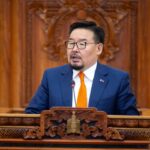
Mongolian Prime Minister Gombojav Zandanshatar has stepped down after only four months as leader of the country, after receiving a crushing vote of no confidence from politicians, the country’s parliament has announced.
Mongolia’s 126-seat national parliament, the State Great Khural, held the vote on Friday in which a reported 111 members of parliament cast their ballots, with 71 supporting Zandanshatar’s dismissal and 40 opposing, according to a parliamentary statement.
- list 1 of 3US trade war, India-China ties loom large at SCO summit in Tianjin
- list 2 of 3Xi welcomes ‘old friend’ Putin who lauds ‘unprecedented’ ties in Beijing
- list 3 of 3Russia, China ink deal to build new gas pipeline as they deepen energy ties
end of list
On October 10, more than 50 members of the legislature submitted a motion to have Zandanshatar dismissed from his post, citing constitutional violations and concerns about governance, according to reports, with the prime minister’s recent appointment of a new minister of justice and home affairs at the centre of the controversy.
The MPs said Zandanshatar’s appointment was carried out unilaterally, without consultation with parliament as required under the Mongolian constitution, and had undermined “the principle of the separation of state powers”.
“[The appointment] encroached on the powers of the President of Mongolia and the State Great Khural, violates the fundamental principles of the constitution, and violates the principle of the rule of law,” parliamentarians said in a statement at the time.
A second criticism of Zandanshatar concerned his public statements about an ongoing investigation, which allegedly undermined judicial independence and the right to the presumption of innocence, while a third alleged that changes he made to pricing mechanisms for major mineral exporters fostered unfair competition.
It was only four months ago that Mongolian lawmakers overwhelmingly voted in the 55-year-old, Russian-educated economist and former vice-director of one of the country’s largest commercial banks.
Advertisement
Zandanshatar replaced former Prime Minister Oyun-Erdene Luvsannamsrai, who was also forced out of office after weeks of protests prompted by reports of lavish spending by his son, which morphed into wider public anger at the country’s political elites.
The landlocked country in northeast Asia – sandwiched between superpowers China and Russia – has endured deep-seated corruption for decades, with wealthy elites facing public anger for hoarding the profits of a years-long coal mining boom.
Luvsannamsrai – who also lost a vote of confidence in parliament in June, before offering his resignation – warned at the time that his removal could lead to further instability in the still-young democracy.
He said if the political situation becomes “unstable, the economic situation deteriorates, and political parties cannot come to consensus” then that could put Mongolia’s “democratic parliamentary system at risk of collapse”.
Losing two Mongolian prime ministers within months will only enhance concerns about stability, casting uncertainty over the country’s future and eroding investor confidence.
British Caribbean News

